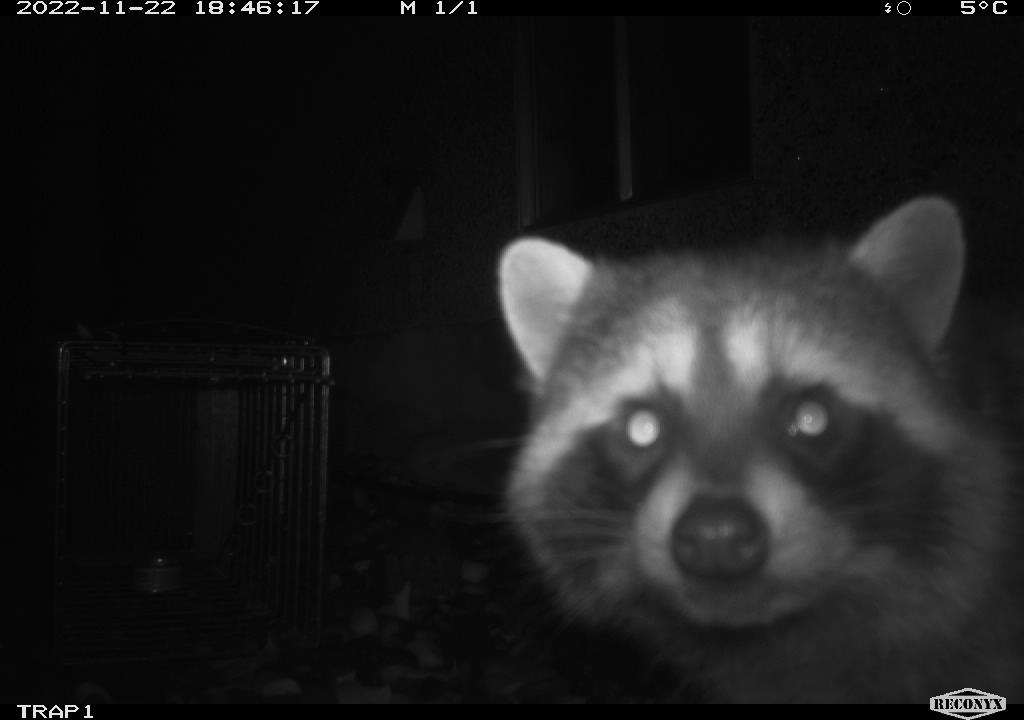Just how smart are ‘trash pandas’? Volunteer your backyard to help scientists find out
August 14, 2023

August 14, 2023

This summer, you can turn your backyard into a raccoon IQ test to help researchers figure out just how brainy your average ‘trash panda’ is.
Raccoons have big brains and thrive in complex city environments. But research on their cognitive abilities, or how they learn and act on information from the environment, is scarce.
Hannah Griebling, a doctoral student in the UBC faculty of forestry, and Dr. Sarah Benson-Amram, assistant professor in the faculties of science and forestry, aim to find out just how smart these furry bandits are and what they can teach us about coexisting with urban wildlife.
HG: We’d like to investigate whether raccoons have something called ‘domain-general cognition’, which means if you perform well in one type of cognitive test, you’ll perform well in another. This type of cognition allows animals, including humans, to adapt to new, changing, and complex environments, like cities.
We’ll also investigate aspects of human-wildlife conflict. We want to know whether raccoons’ cognitive ability makes them more or less likely to engage in behaviours that humans typically don’t appreciate, such as breaking into garbage bins or taking up residence in our attics. We’d also like to know if there are certain areas of Vancouver that have higher levels of conflicts with raccoons, because in many cities there’s a correlation between income level, access to greenspaces, and biodiversity, which may also correlate with human-wildlife conflicts.
HG: To find out about raccoon’s cognitive abilities, we insert a microchip under their skin, just like your pet dog or cat may have, which allows us to identify the raccoons and track their performance on our cognitive tasks in their own habitat. This habitat includes people’s backyards, so we’d like to set out safe, humane traps this summer that are monitored via camera and checked about six hours after they are set after sundown.
The raccoons are sedated for the microchip insertion so they don’t remember it, and then we check they’re OK and give them fresh food and water before releasing them back into the same yard. We’ll then set up cognitive devices in the yard for the wild raccoons to choose to interact with so we can measure their cognitive ability.
These will test different types of cognitive ability, such as memory, learning, self-control, and behavioural flexibility. One will test spatial memory by testing raccoons’ ability to remember where they have found food using several ‘smart’ feeders that recognize the raccoon’s microchip and adjust food rewards accordingly. Then we can look at something called reversal learning by changing which ‘smart’ feeder will reward the raccoon and seeing how quickly they can learn to go to the new feeder. Another will look at tactile discrimination, because racoons have very sensitive forepaws that they use for finding food. Can they tell the difference between two different textures, one of which will give a food reward? Another will examine inhibitory control, or their ability to avoid reaching directly for food that’s behind a transparent barrier. This allows us to see how well they can control themselves in order to solve problems.
SBA: Our research is important for better coexistence with urban wildlife. The United Nations projects that nearly 70 per cent of the world will live in urban areas by 2050, which means more and more people will be living alongside wildlife as urban areas expand into wildlife habitat. This often leads to conflicts between humans and wildlife, such as raccoons breaking into garbage bins for food. The more we know about how urban animals are behaving, the more we can create effective strategies to promote coexistence.
HG: We think of raccoons as smart, but we don’t actually know much about them or their cognitive abilities. And having more knowledge about why and how raccoons are able to thrive in cities may allow us to help other species that are not doing as well.
If you’re interested in volunteering your backyard, you can contact The Urban Wildlife Project at urban.wildlife@ubc.ca.
We honour xwməθkwəy̓ əm (Musqueam) on whose ancestral, unceded territory UBC Vancouver is situated. UBC Science is committed to building meaningful relationships with Indigenous peoples so we can advance Reconciliation and ensure traditional ways of knowing enrich our teaching and research.
Learn more: Musqueam First Nation